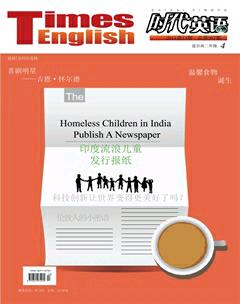词汇短语园地(5)
1. minority n. 少数民族,少数群体;少数,少数派,少
数人
The school is 95 per cent minority.
这所学校里95%的学生来自少数族裔。
For a minority, the decision was a disappointment.
这个决定令少数人失望。
辨析:
比较minority和majority
两者互为反义词,minority意思是“少数人;少数民族”,而majority意思是“大多数,大部分”。
On the last point, he realized, he was a minority of one.
在上一点上,他意识到自己是孤掌难鸣的少数派。
The majority of people interviewed prefer computer to TV.
大多数接受采访的人都喜欢玩电脑而不喜欢看电视。
2. native adj. 出生地的,儿时居住地的;土生土长的,本
地的,当地的
n. 出生于某国(或某地)的人;本地人,当地人
It is a long time since he has visited his native Poland.
他很久没回过他的家乡波兰了。
As a native Australian, do you have any suggestions or recommen-dations for our youth?
你在澳大利亞土生土长,对我国年轻人有何建议或劝告?
After all, Carlo is a native of Nevada, and he knows his way around.
毕竟卡罗是土生土长的内华达州人。他在那一带路熟。
You can always tell the difference between the tourists and the natives.
游客与当地人之间的区别一望即知。
3. run v. 控制,管理,经营;跑,奔跑;(使)运转,
运行;操作
Stop trying to run my life for me.
别老想操纵我的生活。
He has no idea how to run a business.
他丝毫不懂企业管理。
Our van runs on diesel.
我们的货车用的是柴油。
Could you run the engine for a moment?
你来操作一会儿发动机好吗?
(1) run across sb/sth 偶然遇见/看到(某人/某物)
(2) run after 追求;追逐,追赶
(3) run away (from sb/sth) 突然离开,逃离
(4) run out 用完,耗尽;过期,失效
4. custom n. 风俗,习惯,传统,习俗;个人习惯,习
性,惯常行为
It is the custom in that country for women to marry young.
女子早婚是那个国家的风俗。
As was his custom, he knocked three times.
他敲了三下,这是他的习惯。
辨析:
比较custom,habit和tradition
三者都有“习惯”的意思,其中custom指一个国家、民族、社会的行为方式或风俗习惯;habit则侧重于自然养成的、不易改掉的个人习惯;而tradition侧重世代相传的理论、行为规范和生活方式。
Social customs are greatly different from country to country.
国与国之间的社会风俗大不相同。
You need to change your eating habits.
你得改变你的饮食习惯。
They broke with tradition and got married quietly.
他们打破传统,毫不声张地结了婚。
customer n. 顾客,主顾,客户
customs n.(政府部门)海关;关税,进口税
5. foolish adj. 愚蠢的,傻的;出丑;显得尴尬
You ought to be ashamed of your foolish behaviour.
你应当为自己的愚蠢行为而感到羞耻。
Hes afraid of looking foolish in front of his friends.
他怕在朋友前面出丑。
fool n. 蠢人,傻瓜
v. 欺骗,娱乐;说蠢话,干傻事
foolishly adv. 愚蠢地,傻地
foolishness n. 愚蠢
6. firm adj. 牢固的,稳固的;坚固的,坚硬的,结实的;
坚定的,确定的,坚决的;严格的
adv. 坚信,坚持
v. 使强壮,使坚固,使坚实
n. 商行,商号,公司
Stand the fish tank on a firm base.
把鱼缸放在牢固的基座上。
These peaches are still firm.
这些桃子还很硬。
We have no firm evidence to support the case.
我们没有确凿的证据支持这个案件。
She held firm to her principles.
她坚持自己的原则。
This product claims to firm your body in six weeks.
这个产品据称能在六周内使你身体强壮。
They demanded the divorce of the subsidiary from the parent firm.
他们要求子公司与母公司分离。
7. fasten v.(使两部分)系牢,缚紧,扎牢,结牢,扣紧;
(使)关紧,盖好
(1) fasten (sth) (up) 把……系牢/扣紧
Fasten your seat belts, please.
请系好安全带。
He fastened up his coat and hurried out.
他扣好大衣就匆匆出去了。
(2) fasten A to B 把A和B系在一起
There were no instructions on how to fasten the carrying strap to the box.
没有如何把背带系在箱子上的说明。
(1) fasten ones attention on sth 集中注意力于某事上
(2) fasten ones eyes on sb/sth 注視着(盯着)某人/某物
8. fold v. 折叠,对折(纸、织物等);折小,叠平;包,裹
n. 褶,褶层,褶叠部分;褶痕,褶缝
搭配:
fold sth up (back/down/over...) 把……折叠/对折起来
He folded the map up and put it in his pocket.
他把地图折叠起来,然后放进了口袋。
The blankets had been folded down.
毛毯已折叠起来。
(1) fold sb in ones arms 拥抱/搂住某人
(2) fold ones arms 双臂交叉在胸前
(3) fold ones hands 十指交叉合拢交叠
9. adjust v. 适应,使适应,习惯;调整,调节
搭配:
(1) adjust to sth/doing sth 适应某事/做某事
It took her a while to adjust to living alone after the divorce.
她离婚以后,过了一段时间才适应了单身生活。
(2) adjust oneself to sth 使自己适应某事
Youll quickly adjust yourself to student life.
你将很快适应学生生活。
(3) adjust sth (to sth) 调整;调节
Adjust your language to the age of your audience.
要根据听众的年龄使用相应的语言。
adjustment n. 调整,调节;(思想等)调整,适应
adjustable adj. 可调整的,可调节的
10. in use 在使用
From 1900, electric discharge lamps were in use in Europe and the USA.
从1900年以来,欧洲和美国都在使用实用的放电灯。
The conference room is already in use.
会议室已在使用中。
use n. 用,使用,得到利用;用途,功能,用法
(1) be of use 有用的
(2) make use of sth 利用某物
(3) put sth to use 把……投入使用
(4) be no use doing sth 做……没有用
(5) out of use 不再被使用
use v. 使用,利用,运用
(1) be/get used to sth/doing sth 习惯了某事/做某事
(2) be used to do sth 被用来做某事
(3) used to be 过去的样子或状态
(4) used to do sth 过去常常做某事
11. in the distance 在远处
The noise of the car died away in the distance.
汽车的声音消失在远方。
Sadly they saw the shores of England disappear in the distance.
他们黯然地看着英国的海岸在远处消失。
(1) at a distance 稍远一点;离一段距离
(2) at a distance of 以……距离
12. set off 出发,动身,启程
set off = set out,都意为“出发,动身,启程”。
We set off for London just after ten.
刚过十点,我们就动身去伦敦了。
He bade his wife farewell and set out on his journey.
他辞别了妻子便启程了。
(1) set about sth/doing sth 开始做/着手做某事
(2) set aside 留出,拨出;不顾,不理会
(3) set down 记下,写下,登记
(4) set up 竖立,建造;建立,创立

